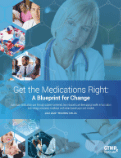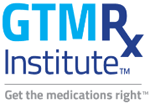|
 VIENNA, VA USA -- HEALTHCARE UPDATE NEWS SERVICE™ -- JULY 22, 2020:
Today, The Get the Medications Right™ (GTMRx) Institute, a catalyst for change that brings critical stakeholders together who are bound by the urgent need to get the medications right, launched "The GTMRx Blueprint for Change," a robust report based on eight months of multi-stakeholder input.
VIENNA, VA USA -- HEALTHCARE UPDATE NEWS SERVICE™ -- JULY 22, 2020:
Today, The Get the Medications Right™ (GTMRx) Institute, a catalyst for change that brings critical stakeholders together who are bound by the urgent need to get the medications right, launched "The GTMRx Blueprint for Change," a robust report based on eight months of multi-stakeholder input.
Studies show nearly 75% of physician office and hospital outpatient clinic visits involve medication therapy 1 and almost 30% of adults take five or more medications. 2 At the same time, non-optimized medication use leads to at least 275,000 deaths annually and costs over $528 billion dollars. 3 The GTMRx report outlines steps for reform, including an evidence-based process of care - Comprehensive Medication Management (CMM) - that personalizes the approach and leads to better care, reduced costs and improved patient satisfaction and provider work life.

The GTMRx Blueprint for Change includes recommendations to engage everyone involved in patient care -- from physicians to clinical pharmacists, health plan sponsors, providers, consumer groups and policymakers. The GTMRx Four Pillars of Medication Management Reform include revamping:
- How we practice: Medications are involved in 80% of all treatments; however, physicians have little time to speak with patients about new medications during a typical office visit. A team-based approach where a medication expert works in collaborative practice with the physician, can significantly impact cost and quality and optimize medication management.
- How we pay: Prescription drug spending exceeds $300 billion a year, but while price and access has been at the forefront of discussions, the GTMRx Blueprint takes a deeper look into the process of care as the solution.
- How we use diagnostics: In an effort to uproot today’s trial and error approach to medication use, companion and complementary diagnostics tools, accompanied by a team-based process of care, can help better evaluate medications to ensure they are appropriate for patients.
- How we integrate technology: It is vital for regulators, care providers and payers to work together to establish standards and best practices for interoperability making clinical data available at the point-of-care to enable the CMM process. With risk stratification tools, new data can be aggregated and integrated to identify those who need the service supporting the medication expert in identifying patients that have not achieved clinical goals of therapy.
The GTMRx Institute is a 501c4 funded by leading-edge health care organizations. The Institute currently includes over 950 members from 650 companies located in 49 states plus the District of Columbia and is actively seeking new members -- from physicians, registered nurses and other health care providers, health IT innovators, drug and diagnostics companies, consumer groups, drug manufacturers, payers, employers and other key stakeholders.
Make a donation to the GTMRx Foundation, a 501c3, and learn more about medication management reform, order the full report.
- McInnis, Terry, et al., editors. The Patient-Centered Medical Home: Integrating Comprehensive Medication Management to Optimize Patient Outcomes. 2nd ed., Patient-Centered Primary Care Collaborative. PCPCC Medication Management Task Force collaborative document.
- Agency for Healthcare Research (AHRQ) Medication Errors and Drug Related Problems; Accessed 6. July 2020. https://psnet.ahrq.gov/primer/medication-errors-and-adverse-drug-events
- Watanabe, J., McInnis, T., & Hirsch, J. (2018). Cost of Prescription Drug-Related Morbidity and Mortality. The Annals of pharmacotherapy, 52(9), 829-837. http://dx.doi.org/10.1177/1060028018765159 Retrieved from https://escholarship.org/uc/item/3n76n4z6
 |
ABOUT THE GTMRx INSTITUTE
The GTMRx Institute™ is a catalyst for change that brings critical stakeholders together, bound by the urgent need to get the medications right. We are physicians, pharmacists, health IT innovators, drug and diagnostic companies, consumer groups, employers, payers and health systems -- aligned to save lives and save money through comprehensive medication management, or CMM. By showcasing evidence and innovation, we motivate practice transformation and push payment and policy reform. Together, we ACT to champion appropriate, effective, safe and precise use of medication and gene therapies. Learn more at gtmr.org.
|
Follow, friend and connect with us!
|